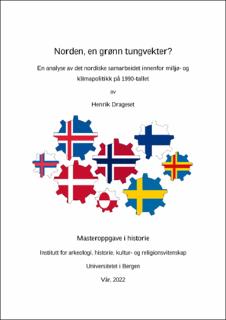| dc.contributor.author | Drageset, Henrik | |
| dc.date.accessioned | 2022-06-08T23:45:23Z | |
| dc.date.available | 2022-06-08T23:45:23Z | |
| dc.date.issued | 2022-05-20 | |
| dc.date.submitted | 2022-06-08T22:01:38Z | |
| dc.identifier.uri | https://hdl.handle.net/11250/2998020 | |
| dc.description.abstract | Denne oppgaven analyserer regionalpolitisk samarbeid rundt miljø- og klimaspørsmål i Norden på 1990-tallet. Nordisk råd og Nordisk ministerråd er de offisielle institusjonene som har ansvaret for samarbeidet i regionen. Det er tilsynelatende en enighet blant forskere (og politikere i de nordiske rådene) om at landene er rollemodeller når det gjelder miljø- og klimarelatert politikk. Målet med dette arbeidet er å undersøke om det nordiske rammeverket i seg selv som har vært viktig for utformingen av den miljø- og klimapolitikken hvert land individuelt og samlet har ført i løpet av 1990-tallet. Har de nordiske samarbeidsplattformene fungert som et politisk verksted hvor landene har jobben sammen på et institusjonelt grunnlag for å utvikle og forsvare sin påståtte ledende posisjon i politikkfeltet? Er det noe genuint nordisk med miljø- og klimapolitikken i Norden? Eller er det mulig at likhetene i politikken har andre årsaker, som at Norden er basert på lignende politiske systemer, har lignende befolkninger, verdier osv. og at de derfor ender opp med lignende løsninger? Til dette formålet har jeg analysert kildemateriale fra store offentlige avispublikasjoner i Norge og Sverige, samt protokoller fra Nordisk råds sesjoner. På denne måten har jeg som mål å øke den overordnede forståelsen av rådets roller som samarbeidsplattformer i regionen. Tre saker undersøkes for å belyse forskningsspørsmålet: debatten rundt hvalfangst, som ble utløst av den norske gjenopptakelsen av hvalfangst i 1993, prosessen før beslutningen om å legge ned kjernekraftverket ved Barsebäck i Sverige i 1997, og prosessen knyttet til FNs klimaavtale i Kyoto i 1997. Sakene er alle grunnleggende basert på miljø- og/eller klimapolitikk, og har samtidig elementer som gjør dem relevante for den regionale politikken i Norden. De sentrale funnene i denne oppgaven er at det institusjonelle nordiske rammeverket og samarbeidet har hatt liten betydning i utformingen av de nordiske landenes miljø- og klimapolitikk. Analysen viser at når konfliktnivået har vært høyt, så har graden av nordisk samarbeid vært lavt. Norden tyr ofte til bilaterale avtaler i stedet for å bruke det institusjonelle rammeverket. Analysen viser også at det har vært et behov/ønske fra involverte parter om at nordisk samarbeid skal fremstå som viktig for å beholde sin relevans. | |
| dc.description.abstract | This thesis aims to analyse regional political co-operation surrounding environmental and climate questions in the Nordics during the 1990s. The Nordic Council and Nordic Council of Ministers are the official institutions which are responsible for the co-operation in the Nordic countries. There seems to be a consensus among researchers (and politicians in the Nordic Councils) that the countries are role models when it comes to environmental and climate related policies. The objective of this work is to examine whether the Nordic framework itself has been important for the environmental and climate policies each country individually and collectively has led during the 1990s. Have the Nordic platforms for co-operation functioned as a political workshop where the countries have worked together on an institutional basis to develop and defend their alleged leading position in the policy field? Is there anything genuinely Nordic about environmental and climate policy in the Nordic region? Or is it possible that the similarities in the policies have other reasons, such as the fact that the Nordics are based on similar political systems, have similar populations, values etc. and that they therefore end up with similar solutions? For this purpose, I have analysed source material from large public newspaper publications in Norway and Sweden, as well as protocols from the Nordic Councils sessions. This way I aim to increase the over-all understanding of the councils’ roles as platforms of co-operation in the region. Three cases are examined for shedding light on the research question: the debate surrounding whaling, which was triggered by the Norwegian resumption of whaling in 1993, the process prior to the decision to shut down the nuclear power plant at Barsebäck in Sweden in 1997, and finally the process related to the UN climate agreement in Kyoto in 1997. These cases are all fundamentally based in environmental and/or climate politics, and at the same time have elements which make them relevant for the regional politics in the Nordics. The central findings in this thesis are that the institutional Nordic framework and co-operation have had little significance on the Nordic countries’ environmental and climate policies. The analysis shows that whenever the level of conflict has been high, the overall co-operation on a Nordic level has been low. The Nordics often resort to bilateral agreements instead of using the institutional framework. The analysis also shows that there has been a need/desire for parties involved that Nordic co-operation should appear important to retain its relevance. | |
| dc.language.iso | nob | |
| dc.publisher | The University of Bergen | |
| dc.rights | Copyright the Author. All rights reserved | |
| dc.subject | Norden | |
| dc.subject | klimapolitikk | |
| dc.subject | kyotoavtalen | |
| dc.subject | nordisk | |
| dc.subject | hvalfangst | |
| dc.subject | miljø | |
| dc.subject | politikk | |
| dc.subject | klima | |
| dc.subject | nordisk råd | |
| dc.subject | miljøpolitikk | |
| dc.subject | nordisk ministerråd | |
| dc.subject | barsebäck | |
| dc.title | Norden, en grønn tungvekter? | |
| dc.title.alternative | The Nordic, a green heavyweight? | |
| dc.type | Master thesis | |
| dc.date.updated | 2022-06-08T22:01:38Z | |
| dc.rights.holder | Copyright the Author. All rights reserved | |
| dc.description.degree | Historie mastergradsoppgave | |
| dc.description.localcode | HIS350 | |
| dc.description.localcode | MAHF-LÆHR | |
| dc.description.localcode | MAHF-HIS | |
| dc.subject.nus | 713107 | |
| fs.subjectcode | HIS350 | |
| fs.unitcode | 11-22-0 | |
